#petit picpus
Explore tagged Tumblr posts
Text

Literally that's what Cosette sometimes does in her convent school days
The nuns all knew that several of their students are severely traumatized one way or another
So they just let those girls do quiet anxiety relieving stuff as long as it isn't harmful and doesn't disrupt the class
Those girls are grateful for that and sometimes doodle or knit in classes
#ptsd#convent school girls#convent school#petit picpus#les miserables#les mis hcs#yes cosette is THAT traumatized give her a break pls
6 notes
·
View notes
Text
Excerpt from One American's Paris, printed in The Northam Advertiser, 13 November 1937:
One evening in Paris, we were playing a game, intended to brush up our knowledge of the city and of its history. The name of a street, or a church, or a museum, or any other locality was called out, and everybody hastily jotted down the first answering bit of information that came to mind. It worked out something like this: "Bois de Boulogne." "Armenonville." "Chestnut trees." "Louvre." "Shopping." "Venus de Milo." "Catharine de Medici." "Grand Palais." "Horse Show " "Salon." "Tuileries." "Commune." "Toy sail-boats.'' "Swiss Cuard." "Hotel de Sens" ??? "Picpus." Ah, that's easy. But, when the answers to this were read, among the "Pershings," and the "La Fayettes," someone had put down: "Little Cosette." The name was vaguely familiar. . . . . ."What did you say? 'Jean Valjean?' 'Javert?' 'Victor Hugo?' Oh yes - Les Miserables." A few days later, having meantime found the book, I traversed the miles of Paris that separate the Convent of Picpus from my hotel. As the taxi slowed down beside a high wall, whom should I see hopping out of another but the little girl of the croquet game [that the author had previously watched], followed by her maid. This time the child smiled at me and began at once, with evident excitement: "Do you suppose it was right here that Jean Valjean climbed the wall? How could he have ever wriggled himself up and pulled little Cosette over too! Oh, she must have been glad once they were beyond Javert's reach, And just think of the good fortune they had to find old Fauchelevent in there, covering up melon plants! It all worked out so nicely when the nuns took Cosette and Jean Valjean could stay round and help in the garden!" I began to think this enthusiastic child must be an amusing traveling companion— for the strong. So, when she ended up with: "We like the same things in Paris, don't we? Have you ever been inside one of their schools, or seen the 'coucher du soleil de Napoleon?' But, that, would have to be next year now," I decided to follow her advice about the first and to find out what in the world she meant by the other.
#les miserables#fans through the ages#convent digression#petit picpus#Victor Hugo spreading misinformation
3 notes
·
View notes
Text
my fellow brick readers, i have a question. what was your least favorite book(s) to read in the whole thing.
#for me it was/is petit-picpus#and parenthesis#idk man i hated the learning about catholics and nuns#i dragged myself through reading it#les mis#les miserables#les misérables#EDIT: GUYS YOU MADE ME REMEMBER ARGOT#fully last time i read the brick i remember skipping the whole section#apologies to any brick purists who disagree with skipping sections#but i was a high schooler with low tolerance#anyways amending my answer to also include argot
55 notes
·
View notes
Text
can you imagine reading one book for seven years bc i can and that's me and the brick
#it has literally hit me on the head when it fell from the shelf#with the shelf#it couldn't handle that weight of knowledge#I'm still stuck at le petit picpus 😭#les mis
2 notes
·
View notes
Text
"The one where I decided to play Victor Hugo"
Y'know, I truly wanted to see an adaptation of Les Misérables set in some Latin American country, and also in a more modern setting.
Yes, I know that some elements of the original novel could probably be lost due to the change in time period (and place), but at least there would be a HUGE chance of seeing little Euphrasie "Cosette" Fauchelevent wearing school clothes that looked like these:


(In case you're curious, these pictures are from two Mexican soap operas, "Gotita de Amor" and "Carita de Àngel")
And don't even get me started on the First Communion dresses.


(I don't know for sure if this applies to all Latin American countries, but I know it was a common occurrence until some point – especially during the late 19th and 20th century)
And while we're on the subject, allow me to give you a little piece of history:
So, the school I attended as a child was originally designed to be a school for girls and young women only. A "single-gender school", if you will.
Here is a short excerpt from a local news report about the school:
"On July 21, 1903, eight Benedictine Sisters arrived in Olinda, Pernambuco [...] They were invited to help in the future mission in the Amazon region. As this mission took a long time to be carried out, the sisters found another field of apostolate: in the catechesis and education of youth."
From the beginning, the Benedictine Sisters have dedicated themselves to the education of young people and women above all else. Schools have been established in the places where they have settled. Thus, throughout their history, many types of educational institutions have emerged [...] including a College in Olinda and a Conservatory of Music in Manila. In the Philippines, the Sisters run 25 schools belonging to the Congregation, with approximately 30.000 students. In addition to these educational institutions, there are other educational institutions, such as: Household Schools, Dressmaking Courses, Schools for the Disabled, Nursing Schools and Bible Schools. In addition, courses of all kinds are offered to meet the specific needs of people."
YES, THE BENEDICTINE SISTERS ARE BACK EVERYONE
Normally, schools of this type, in this case, those that were "single-gender", were private – requiring a certain amount of money to be paid each month. But for students who came from poorer families, it was possible to get a scholarship.
I don't know much about this information, but apparently there were some rooms available within the school property, where students could stay overnight during the week. This was because e some of the students lived in places that were far from the city (in rural areas for example) and this made it difficult for them to have to travel every day to attend classes.
Since that was where the nuns lived, they had no problems regarding food, comfort or safety of the students either.
And, of course, no boys were allowed
The uniforms, as you will see in the images below, consisted in:
Long-sleeved white blouses. But there were also short-sleeved blouses for outdoor activities.
Long, dark blue pleated skirts with suspenders;
White socks;
Black shoes;
White gloves and a dark blue beret – which matched the tone of the skirts.


I had one of those by the way, but we didn't use it on a daily basis, only on special school occasions: like church, the school anniversary and marching band parades.
Unfortunately (or not), by the time I attended the school, many of the original traditions had been lost over time. The nuns were no longer responsible for teaching the classes – but they still lived on the school property, three of them more specifically. Both girls and boys could study at the school, and our curriculum was no longer the same.
Now, imagine my shock when I discovered that my aunt, her sisters and friends (who also attended this school) used to have French lessons. They even learned how to sing the French national anthem...
I was a little jealous of them, to be honest 😭
#les misérables#les mis adaptations#victor hugo#cosette fauchelevent#les misérables petit picpus#the brick#les mis#les mis brazil
3 notes
·
View notes
Text
New House sorting quiz!
For Les Mis Letters, we just learned about the four Houses that everyone who goes to the boarding school gets divided into. So I made a House Sorting Quiz - it's a brand new idea from Les Mis fandom (c. 1865.) What House are you in?
123 notes
·
View notes
Text
Not enough people talk about the frankly insane word choices in Volume 2 when Javert is chasing Valjean near Petit-Picpus.
I can't tell if it's just the Finnish translation being weird or if this scene just has psychosexual undertones. Like Javert is described as "toying with his prey", he has "a moment of hellish pleasure", he's so happy he indulges in some snuff, he "swallows [Valjean] with his gaze", and one sentence is literally just "Javert enjoyed [this]." They also use the word "arouse" and an adjective I've never seen used outside a sexual context (it translates to something like licentious or orgiastic).
I need some French or English readers to pitch in. Is the scene always this homoerotic or did the Finnish translator just go wild?
77 notes
·
View notes
Text
It’s fascinating how Jean Valjean is constantly associated with imagery of being buried alive.
His literal near-burial in the coffin outside Petit-Picpus is the most obvious example of that. But it’s in the sewers chapters as well— he has to face the horror of nearly drowning and being buried alive deep underground in the filth beneath the city.
And that imagery a running motif throughout his entire storyline. His imprisonment is constantly compared to as a burial, a living death; being in prison is like being trapped and drowned underneath an enormous weight, unable to move, unable to escape, with everyone around you refusing to acknowledge you are still a living human being.
In his dream before the Champmatheiu trial, Jean Valjean had a nightmare where he’s surrounded by a faceless crowd of indifferent people, who tell him:
‘Do you not know that you have been dead this long time?’
I opened my mouth to reply, and I perceived that there was no one near me.
The core horror of Jean Valjean’s plotline is the horror of being buried alive. It’s the horror of being constantly told that he is dead when he’s still living and suffering and desperately struggling to escape—- but suffering alone while he’s buried in a place so deep that no one can hear him.
#what I’m saying is that in the Magnus Archives …Jean Valjean is an avatar of The Buried#Javert is obviously the Hunt#les mis#les mis letters#relevant to the sewer chapters#lm 5.3.7#lm 2.8.7#lm 1.5.7#lm 1.5.8#buried alive
231 notes
·
View notes
Note
yooo you wanna draw valjean doing gardenwork while at petit-picpus (or like anywhere? rue plumet would prolly be neat too). i hope this is enough information. uhm. hes probably gonna be wearing a large straw hat too

here you go bestie pal amigo friend buddy bestie pal
as for the straw hat……
it uh. blew off his head (I TOTALLY DIDNT FORGET IT)

btw guys this was the post asking for requests. rn i probably wont do any but yall are always free to ask! (animation requests could be fun too!)
#art requests#les mis#my art#my animation#jean valjean#cosette fauchelevent#<- technically#it took a while BUT#this was fun :]#i haven’t actually animated in a while so this was great!! helped me get more comfortable with the program as well :]]#now idk how good this actually is but yeah 👍#(im not good at drawing backgrounds 💀)
72 notes
·
View notes
Text
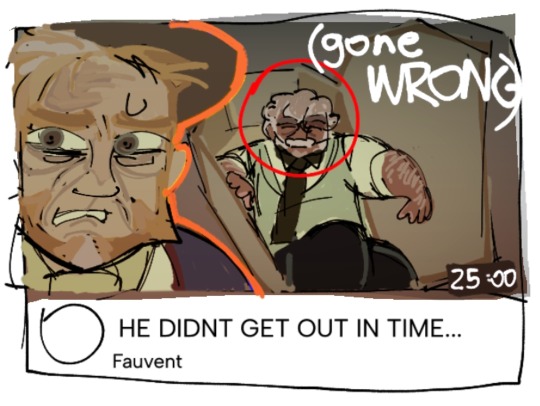
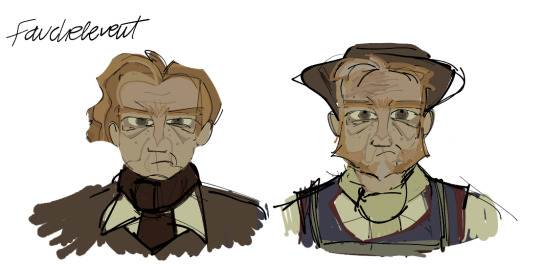
(repost) fauchelevent is underrated tbh . wish there was more fanart of the petit-picpus era characters :p
#the coffin heist always gave off “mrbeast youtube video” plot tbh😭😭#fauchelevent#jean valjean#les mis#les mis fanart#ultime fauchelevent#character design
144 notes
·
View notes
Text
Cosette and her religious upbringing
Cosette's beliefs of ' pacifist Rebellion against social injustices ' and strong Catholic faith also largely came from her religious upbringing in Petit Picpus Convent
The Petit Picpus Convent school is structured as a mix of a girls' orphanage ( all the primary school girls there are actually also orphans ) and a girls boarding school.....in a Convent run by nuns.
The educational programme in that school includes religious studies, culinary studies, visual arts ( which includes embroidery and pottery and several more ), several languages, etc.
School assemblies and masses are held in the convent prayer section, the convent school girls pray at every meal time and every night before they go to sleep, and often times, the school girls hang out at the convent gardens or the Convent school library in break times
Do not mistake such a disciplinary routine of the Petit Picpus Convent school girls for harshness. The nuns in general are all firm yet gentle with the girls, and offered much needed therapy and health care to those in need ( including Cosette, for starters ). Such disciplinary routines at the Convent school also helped build Cosette's strong catholic faith, and also her gentle and strong character



#cosette#les mis#petit picpus convent school#cosette is very religious#cosette is a devout catholic#petit picpus convent
9 notes
·
View notes
Text
Round 1, Matchup 85: II.iii vs II.vi
12 notes
·
View notes
Text
les mis and Ninety-Three are connected and this totally influences the fate of the characters!
Guys, please read this entire theory! EVERY detail is important! First of all, you need to know that Ninety-Three was Victor Hugo's last book, so he already had access to ALL the references present in the previous books! the character Gauvain has similarities with the character Enjolras, Michelle has similarities with Fantine and Cimourdain has similarities with Javert!
the book Ninety-Three was CREATED TO BE PART OF A TRILOGY THAT INCLUDED THE MAN WHO LAUGHED AND ANOTHER BOOK that was never written! The preface of The Man Who Laughs announces the future release of Ninety-Three!
L’HOMME QUI RIT
De l’Angleterre tout est grand, même ce qui n’est pas bon, même l’oligarchie. Le patriciat anglais, c’est le patriciat dans le sens absolu du mot. Pas de féodalité plus illustre, plus terrible et plus vivace. Disons-le, cette féodalité a été utile à ses heures. C’est en Angleterre que ce phénomène, la Seigneurie, veut être étudié, de même que c’est en France qu’il faut étudier ce phénomène, la Royauté. Le vrai titre de ce livre serait l’Aristocratie. Un autre livre, qui suivra, pourra être intitulé la Monarchie. Et ces deux livres, s’il est donné à l’auteur d’achever ce travail, en précéderont et en amèneront un autre qui sera intitulé: Quatrevingt-treize. Hauteville-House, 1869.
it is necessary to know Victor Hugo's lover: Julienne Josephine GAUVAIN, also known as Juliette Drouet! YES, she inspired the name of the noble family featured in the book Ninety-Three!

Now check this out! I'M SURE you'll be impressed
Les miserables vol 2 cosette book sixth - Le petit picpus chapter VII- some silhouettes of this darkness
The most esteemed among the vocal mothers were Mother Sainte-Honorine; the treasurer, Mother Sainte-Gertrude, the chief mistress of the novices; Mother-Saint-Ange, the assistant mistress; Mother Annonciation, the sacristan; Mother Saint-Augustin, the nurse, the only one in the convent who was malicious; then Mother Sainte-Mechtilde (Mademoiselle GAUVAIN), very young and with a beautiful voice; Mother des Anges (Mademoiselle Drouet), who had been in the convent of the Filles-Dieu, and in the convent du Trésor, between Gisors and Magny; Mother Saint-Joseph (Mademoiselle de Cogolludo), Mother Sainte-Adélaide (Mademoiselle d’Auverney), Mother Miséricorde (Mademoiselle de Cifuentes, who could not resist austerities), Mother Compassion (Mademoiselle de la Miltière, received at the age of sixty in defiance of the rule, and very wealthy); Mother Providence (Mademoiselle de Laudinière), Mother Présentation (Mademoiselle de Siguenza), who was prioress in 1847; and finally, Mother Sainte-Céligne (sister of the sculptor Ceracchi), who went mad; Mother Sainte-Chantal (Mademoiselle de Suzon), who went mad.
This nun with the surname Gauvain will be mentioned again! (did you notice that she has a small highlight?)
les miserables volume iv Saint Denis book fourth succor from below may turn out to be succor from on high chapter i A wound without, healing within
Sister Sainte-Mechtilde had taught Cosette music in the convent; Cosette had the voice of a linnet with a soul, and sometimes, in the evening, in the wounded man’s humble abode, she warbled melancholy songs which delighted Jean Valjean.
You might think it was just a tribute from Victor Hugo to his beloved, but what if I told you that it makes sense that this nun is related to two characters present in Victor Hugo's last book!
Les miserables volume ii cosette book sixth— le petit-picpus chapter III— austerities
One is a postulant for two years at least, often for four; a novice for four. It is rare that the definitive vows can be pronounced earlier than the age of twenty-three or twenty-four years. The Bernardines-Benedictines of Martin Verga do not admit widows to their order.
This shows that she is not a Gauvain through marriage but rather a Gauvain by birth! To be a Gauvain by birth she needs a Gauvain father! So her father is either the Viscount Gauvain or the Marquis de Lantenac!
Gauvain était-il amoureux ? Oui. De miséricorde. Faire grâce était son idéal. Pas de femme. Il semblait qu’il n’eût qu’une pensée dans ces temps terribles : attendrir la guerre civile
This deleted scene shows that Gauvain could only have married due to social pressure!
Being Gauvain's daughter, the nun could be at least 30 years old during the events of Les Misérables, it turns out that Victor Hugo describes her as very young, “her father” Gauvain is also described as young at that age…
In this part of the book Ninety-Three! we see that Lantenac has several candidates for his wife!
C’était un homme à femmes avant d’être un homme de guerre.
Remember that men can be fathers at any age! Check out the list of the oldest fathers in history! remember that Lantenac needed an heir after what happened to Gauvain!
Whether he was a father or not, Lantenac knew this girl! AND HE LIVED AT PETIT PICPUS! Yes! I'll show you how sure I am of that!
Les miserables volume ii Cosette book eighth— cemeteries take that which is committed them chapter IX—CLOISTERED
The walls of this chamber had for ornament, in addition to the two nails whereon to hang the knee-cap and the basket, a Royalist bank-note of ’93, applied to the wall over the chimney-piece, and of which the following is an exact facsimile:—
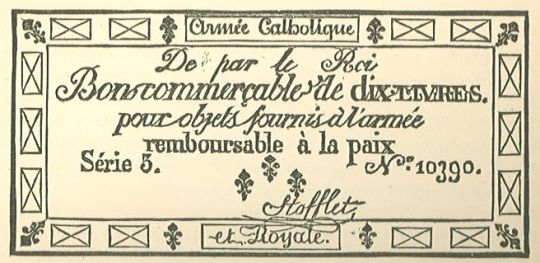
This specimen of Vendean paper money had been nailed to the wall by the preceding gardener, an old Chouan, who had died in the convent, and whose place Fauchelevent had taken.
Yes, the nuns know about Lantenac's past… and did you know that they paid homage to him when choosing Mademoiselle Gauvain's name as a nun? Saint Mechtilde was a saint known for her musical talents and her relationship with the Sacred Heart of Jesus (Chouan symbol)


I'm reading an excellent book by a Pullitzer Prize winner: The Black Count: Glory, Revolution, Betrayal, and the Real Count of Monte Cristo! I LOVE Alexandre Dumas and I think everyone should read his books and get to know his works! I think these excerpts from the book justify the nuns' view
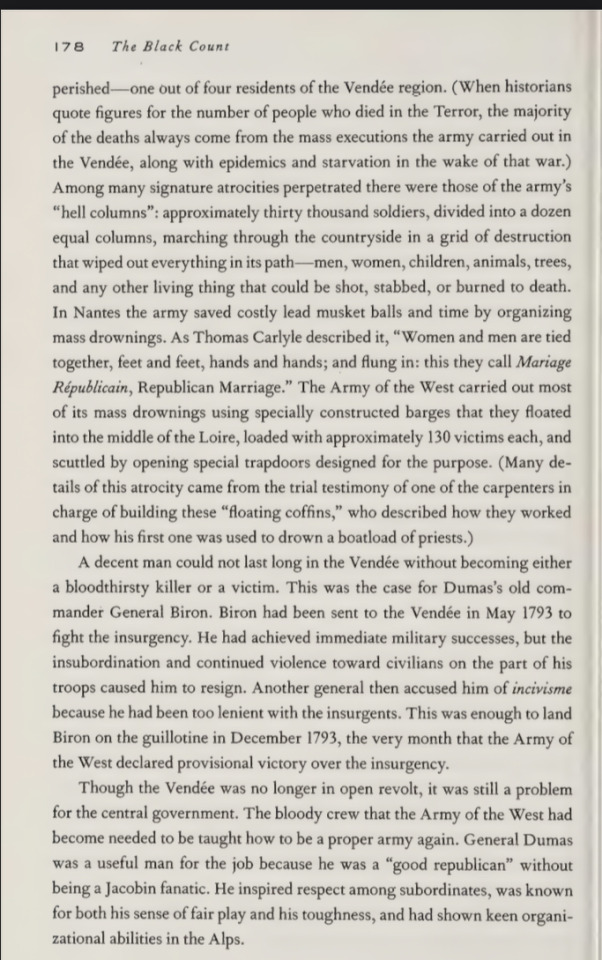
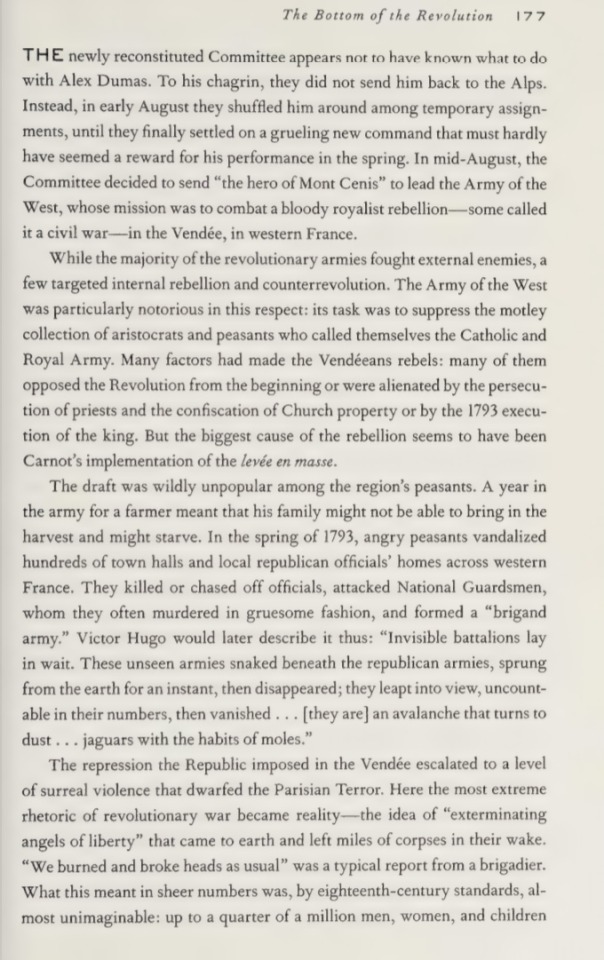
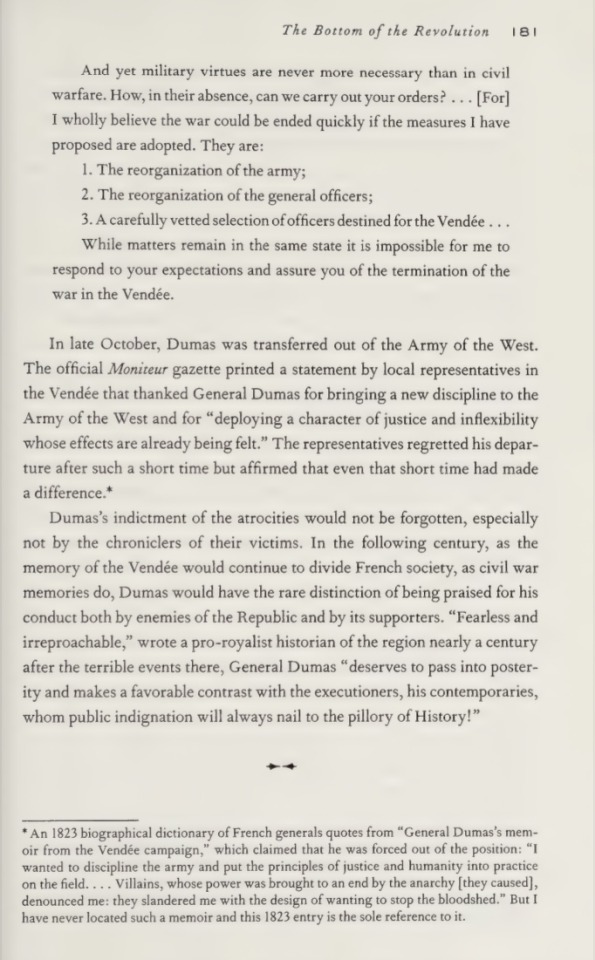
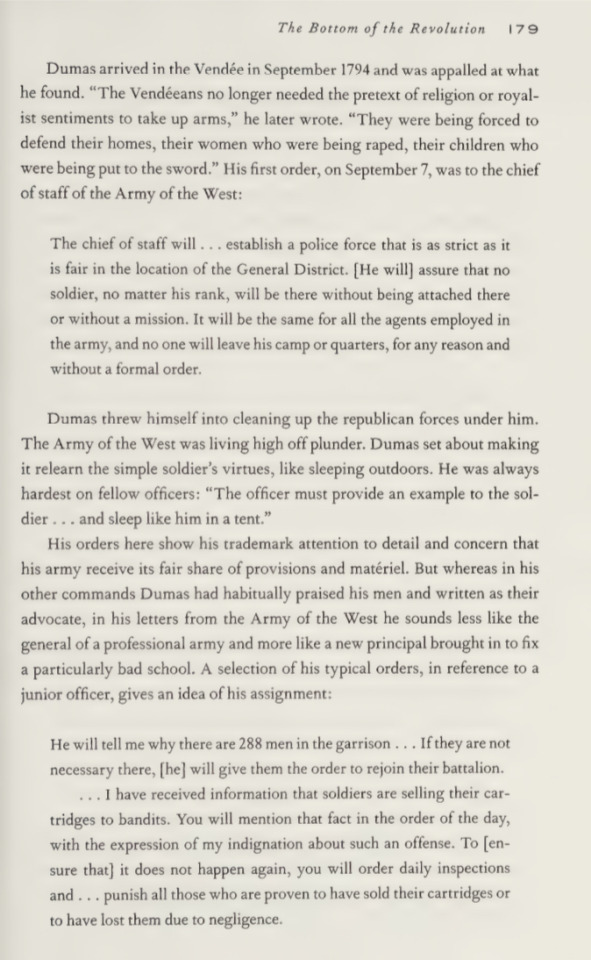
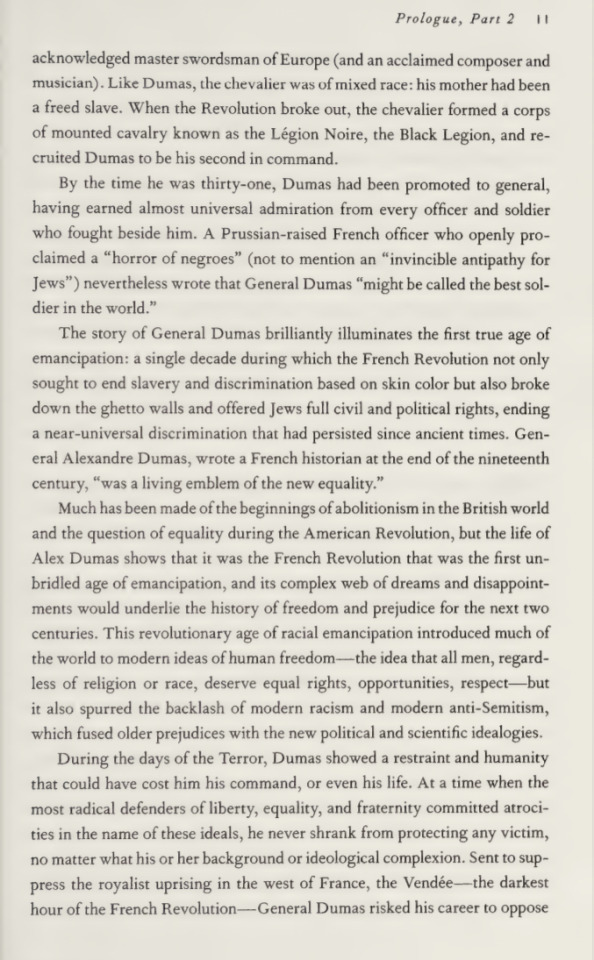
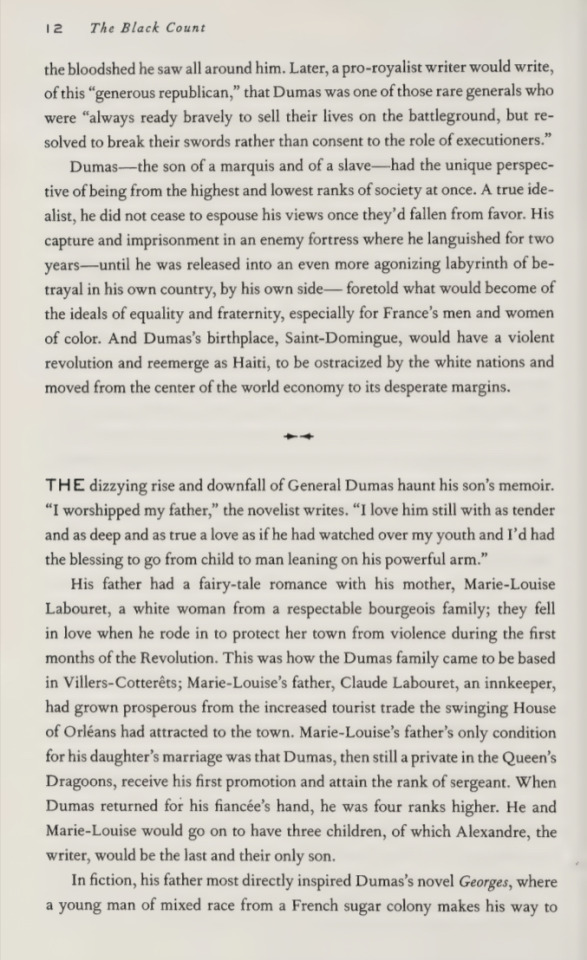
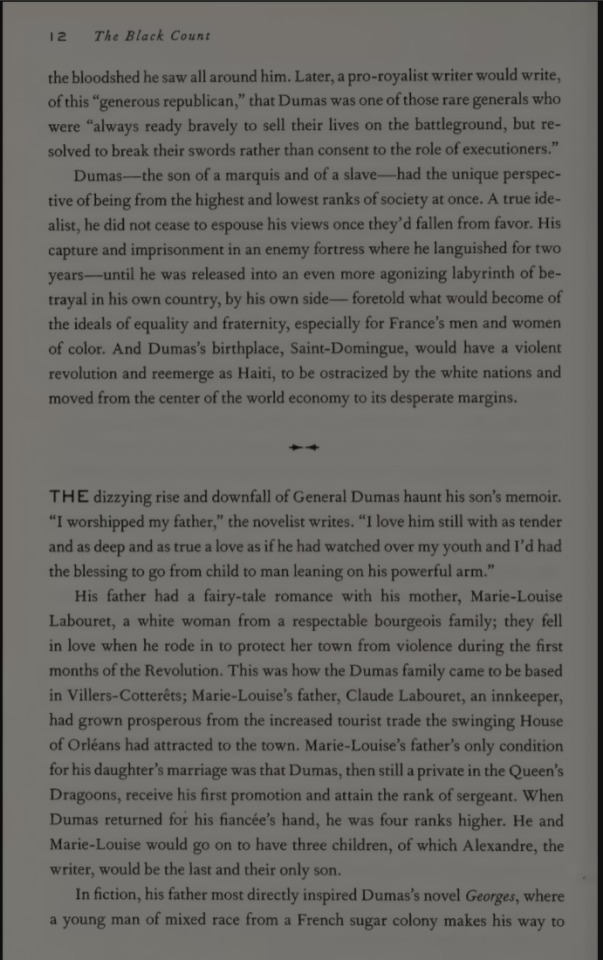
I started researching the Vendee War and both books after reading this biography about Alexandre Dumas' father!
In your opinion, who is this nun's father?
so there are two options: she is the daughter of the Marquis de Lantenac and second cousin of Gauvain or she is the daughter of Gauvain and the Marquis is her arrière-grand-oncle (I don't speak French so correct me if I'm wrong!)
#Les mis#cosette#jean valjean#Ninety-Three#Fauchelevent#Les miserables#Quatrevingt-treize#Lantenac#Gauvain#Ninety Three#Quatrevingt treize#Les Misérables#victor hugo#The brick#cosette fauchelevent#Cosette les mis
15 notes
·
View notes
Text


The old nuns at the Little Convent of Petit-Picpus. Volume 2, Book 6, Chapter 6.
#Les miserables#les mis#My Post#The Convent#Nuns#The French Revolution#The Brick#Historical Pictures#Les Mis Letters
13 notes
·
View notes
Text
Congratulations, Les Mis Letters readers, on finishing Volume 2: Cosette! 🎊
A wild journey from Waterloo, to the ship Orion, to Montfermil, to the Gorbeau House in Paris, and finally to the Petit Picpus convent and a wacky coffin heist.
On to Volume 3!
45 notes
·
View notes
Text
The one, in which Valjean finds himself ensnared. But before that, he navigates instinctively through the fictional neighbourhood of the Petit-Picpus. Yes, this convent never existed, as hinted by Hugo: “Le Petit-Picpus, which, moreover, hardly ever had any existence.” Keep this in mind while delving into the convent digression. Hugo indulges in fantasy when describing the convent.
Meanwhile, Valjean's movements, in a desperate attempt to evade capture, echo his instinctive navigation through the sewers. There, as here, some paths lead to danger while others lead to freedom. Cosette's presence hinders him; though tired, she doesn't complain, simply walking slowly or sitting silently in his arms. He picks her up and sets her down as needed—a tender act from this caring old man (though it evokes the joke about a drug addict and a baby elephant.)
Then, Valjean realizes he's been trapped when he spots a black figure 'lying in wait for him' ahead. Javert is portrayed as devilishly predictive and knowledgeable about the labyrinth of Paris streets, somehow anticipating Valjean's route and positioning his men accordingly. Javert himself pursues Valjean, moving 'in the distant darkness.' Spooky! Valjean faces an impossible dilemma: 'to advance was to fall into this man’s hands; to retreat was to fling himself into Javert’s arms.' So, he simply raises his eyes towards heaven.
26 notes
·
View notes